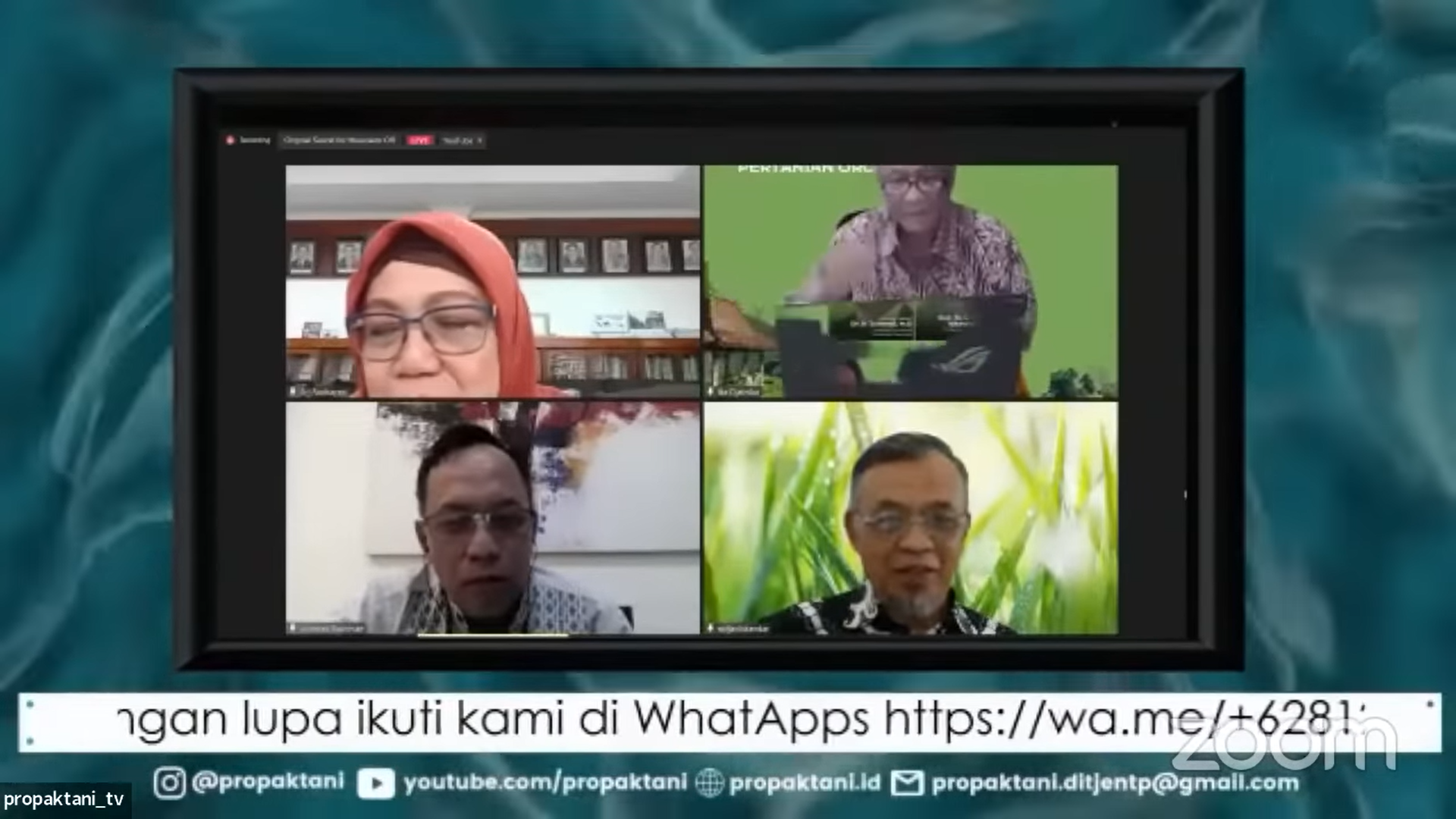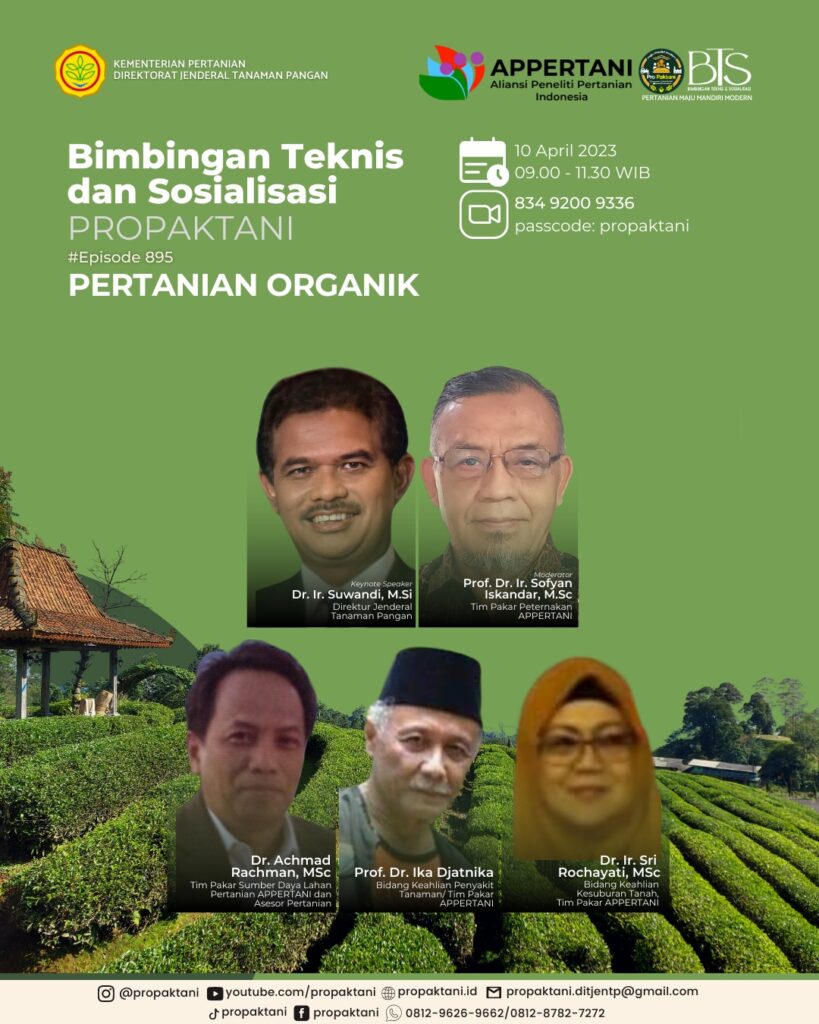Online Socialization and Technical Guidance (WEBINAR) #EPISODE 895 PROPAKTANI

ORGANIC FARMING
The Green Revolution (GR) began to be implemented in Indonesia in the 1960s in the form of the Panca Usaha Tani technology package, mainly the use of new high-yielding varieties, chemical fertilizers, and synthetic organic pesticides, supported by the mass guidance movement (BIMAS). The adoption of GR succeeded in increasing rice production, thus changing the status from an importing country to a rice self-sufficient which was recognized by FAO for the first time in 1984. After self-sufficiency, rice production faces problems such as, productivity slows, excessive external use of fertilizer inputs and chemical pesticides, it is feared that it will be difficult to provide healthy food, prosper farmers, reduce greenhouse gas emissions, preserve the environment, and comply with free trade agreements, WTO rules and others. In Webinar Episode 895, APPERTANI had the opportunity to organize a webinar on the topic of Organic Farming to meet the demands mentioned above. The moderator of this webinar episode was Prof. Dr. Sofyan Iskandar, APPERTANI’s livestock expert.
Dr. Achmad Rachman, M.Sc, APPERTANI Land Resources Expert Team who is also an Organic Farming Assessor conveyed the topic of Organic Farming: A Demand in the Future. He emphasized that the main key to food security sustainability lies in the ability to manage carbon “C”. Soil organic matter affects soil quality, being one of the determinants of environmental quality, which in turn determines the sustainability of agriculture. Green Revolution as an Agricultural Revolution (AR) III, after neolithic and historic AR which caused dependence on external inputs, inorganic fertilizers and pesticides that continued to increase with all its negative impacts, needed to return to nature with the Evergreen Revolution through the application of organic farming. Organic farming has applied the concept of circular economy as an alternative to linear economy through the application of recycling and zero waste. Organic farming applies SNI 6729:2016 and must obtain a certificate for commercialization organic products.
Prof. Dr. Ika Djatnika, Plant Disease Expert, APPERTANI Expert Team delivered the topic of Natural Ingredients as Organic Fertilizers, Biofertilizers and Biopesticides in Plants Supporting organic farming, as a step to face synthetic chemical fertilizers and pesticides that are increasingly rare and expensive, in addition to meet global clean and green demands and the implementation of ISO 1400 on production health insurance. Organic fertilizers that have been used are: 1) organic fertilizer animal manure: horses, cows, goats, chickens, sheep, vermicompost, black soldier fly dung; 2) plant residues; 3) household waste, markets, fish waste; 4) litter for mulching. Organic fertilizer has been used for vegetables and rice. Biofertilizers contain microorganisms that can function as: 1) Nitrogen fixers from the air, 2) phosphate decay, 3) potassium decay, 4) organic matter decay, 5) phytohormones and 6) biological control (biological pesticides).
Dr. Ir. Sri Rochayati, M.Sc. Soil Fertility Expert, APPERTANI Expert Team reemphasized the time to realize organic farming in anticipating chemical fertilizer problems. The green revolution implemented by the government succeeded in bringing Indonesia to achieve rice self-sufficiency but caused dependence on chemical fertilizers and the use of organic fertilizers almost neglected. The use of chemical/inorganic fertilizers is unwise (excessive) negatively affects plant productivity, the environment, and human health. Organic-based farming systems are expected to increase production with environmentally friendly agriculture, improve the quality and quantity of production, and follow the trend of a “back to nature” lifestyle. Organic farming in accordance with SNI 6729:2016 is designed to: 1) develop biodiversity in the system as a whole; 2) increase soil biological activity;3) maintain and recycle waste of plant and animal origin. Organic farming does not provide an instant reaction to agricultural products, but in the long run provides solutions for the availability of healthy food and as a practical problem-solving method for farmers who are constrained by the availability of chemical fertilizers.


